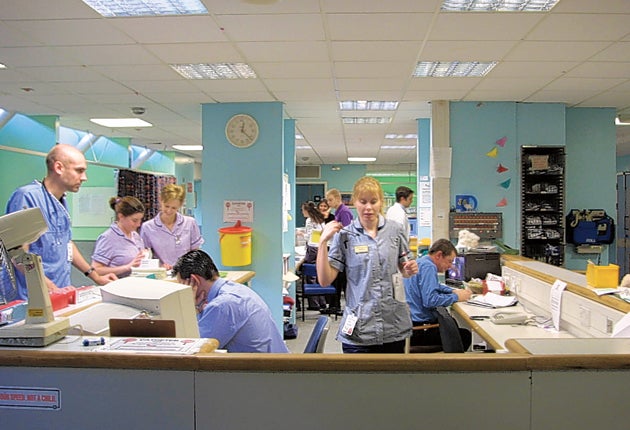Watchdog’s prosecution sends a strong message to safety laggards: Time’s up
Health correspondent Shaun Lintern considers the latest action against an NHS trust by the Care Quality Commission


Your support helps us to tell the story
From reproductive rights to climate change to Big Tech, The Independent is on the ground when the story is developing. Whether it's investigating the financials of Elon Musk's pro-Trump PAC or producing our latest documentary, 'The A Word', which shines a light on the American women fighting for reproductive rights, we know how important it is to parse out the facts from the messaging.
At such a critical moment in US history, we need reporters on the ground. Your donation allows us to keep sending journalists to speak to both sides of the story.
The Independent is trusted by Americans across the entire political spectrum. And unlike many other quality news outlets, we choose not to lock Americans out of our reporting and analysis with paywalls. We believe quality journalism should be available to everyone, paid for by those who can afford it.
Your support makes all the difference.The announcement on Friday by the Care Quality Commission that it will bring criminal charges against an NHS trust for failing to provide safe care to a patient is a hugely significant milestone in efforts to bring about greater accountability and safer care in the health service.
The CQC has had the power to bring such prosecutions against hospitals since April 2015 when it was given a suite of new legal powers to hold hospitals to account on the care they give to their patients.
Bringing in the new laws, the so-called fundamental standards of care, was one of the most significant actions taken after the care disaster at the Mid Staffordshire NHS Trust, where hundreds of patients suffered shocking neglect, with some dying as a result.
Prosecuting East Kent Hospitals University Trust over the tragic 2017 death of baby Harry Richford is a big step for the CQC and a consequence of the long-forgotten battles of many patients and families in Stafford who were told they were wrong in their complaints against the hospital.
It will almost certainly lead to more calls for criminal charges against hospitals from families who have been failed.
There are countless examples of NHS trusts not acting on safety warnings and patients coming to harm as a result. Just this week an inquest into the case of baby Wynter Andrews at Nottingham University Trust revealed fears over safety had been highlighted to the trust board 10 months before her death.
At Shrewsbury and Telford Hospitals Trust there are hundreds of families asking the same questions as more evidence emerges of long-standing failures to learn from its mistakes.
And these issues go beyond maternity and extend to the care of NHS patients in many different settings.
The CQC has carefully trod a difficult path over the years since the Stafford Hospital public inquiry. It has used its somewhat blunt hospital ratings to highlight those hospitals performing poorly and attempted to use its inspections and powers to force improvements in care.
Rarely has it pressed the button on bringing criminal charges.
But only last month it brought the first ever prosecution against an NHS trust for failing to be open and honest with a family after a mistake.
Its chief executive Ian Trenholm has provoked anger among NHS leaders and clinicians when he advocated taking a tougher line when trusts break the law.
But it is unlikely the CQC will launch a slew of prosecutions. It has said it will bring cases only where it sees patterns of behaviour and systemic failings. That is the correct approach as healthcare is complex and single errors will sadly happen despite everyone doing their best.
This is not about heavy handed regulation.
Many might not welcome being regulated but for too many patients once something goes wrong in their care, they often come up against the health service’s default setting of defensive denial and obfuscation.
This prosecution sends a strong message to hospitals. The CQC has given the NHS more than five years to get to grips with the new laws and to demonstrate improvements in patient safety. Now perhaps it is finally saying time’s up and the laggards who are stuck in the past can expect to be brought to book.
In many places good efforts are being made. But in some hospitals the old ways are proving hard to change and the CQC is now showing it is prepared to hold those trusts to account.
Many people will point out such action will not make patients safer. Of course it won’t, in and of itself.
When he launched the findings of his public inquiry into Stafford Hospital, Sir Robert Francis QC told me then that these laws were not themselves for that purpose. They were a backstop, a final option to bring justice for the most egregious failings.
And they serve to support the other measures now being pursued in the NHS patient safety strategy launched last year. It all has to hang together but for too long the final jigsaw of real proper accountability has been lacking. And it arguably still is in terms of managers who cover up and lie and are allowed to move on without real action. That’s a fight still be won.
The prosecution won’t instantly make babies at East Kent safe. It won’t bring Harry Richford back. But his family have in a short time achieved justice, an apology, an inquiry and the truth. Quite understandably they are now stepping back.
Elsewhere, other families have faced more than a decade of fighting to get even the simplest of answers. The long-term mental anguish such struggles take is itself a harm to be avoided.
Bringing prosecutions like this help to do that and they help to make clear to hospitals what will no longer be tolerated.



Join our commenting forum
Join thought-provoking conversations, follow other Independent readers and see their replies
Comments